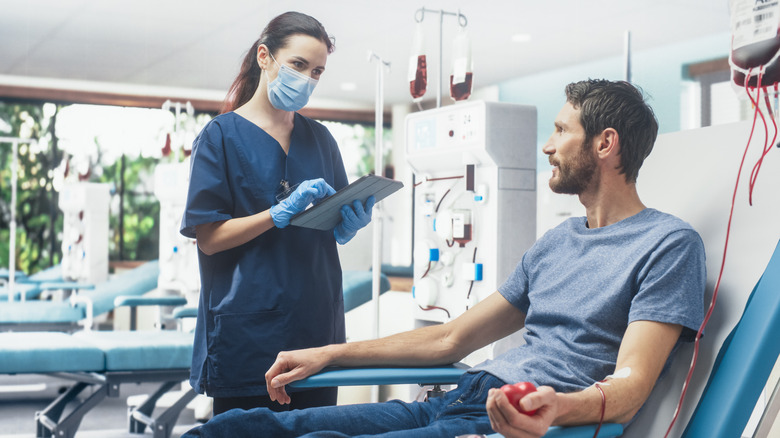Blood Types That Could Increase Your Risk Of Stomach Cancer
Most people don't know their blood type unless they're donating blood or getting ready for surgery. You inherit your blood type from your parents, and most people fall into one of four groups: A, B, AB, or O. These letters refer to the combination of sugars and proteins (called antigens) on the surface of your red blood cells. They also relate to the antibodies floating around in your blood plasma. The positive or negative after your blood type shows whether you have another kind of antigen called the Rh factor.
While that might sound a little technical, your blood type can actually affect how resistant or vulnerable you are to certain diseases. That's because antigens and antibodies play a big role in your immune system. For example, people with A or AB blood types have a higher risk of developing stomach cancer, according to a 2019 study in BMC Cancer.
The study found that compared to people with type O blood, those with type A had a 13% higher risk of stomach cancer, and those with type AB had an 18% higher risk. The researchers also combined results from 40 other studies and found similar patterns. People with type A had a 19% greater risk, and those with type AB had a 9% increased risk of stomach cancer.
The possible link between blood type and stomach cancer
It's important to clarify that the study doesn't suggest that having blood type A or AB directly causes cancer. After all, plenty of people with other blood types also develop stomach cancer. But there may be some biological differences among blood types that make stomach cancer more likely. These differences could include how the body handles inflammation, how cells communicate, and how the immune system detects cancer cells. For example, people with blood type A may produce less stomach acid compared to those with blood type O.
The study also pointed to earlier research showing that people with blood type A are more likely to become infected with Helicobacter pylori, a type of bacteria that has been linked to stomach cancer, especially the more harmful strains. In this study, people with blood type A had a higher risk of stomach cancer regardless of whether they were infected with H. pylori. However, people with blood type AB were more likely to develop stomach cancer if they had an H. pylori infection.
Risks and signs of stomach cancer
Stomach cancer isn't super common in the United States, but it's actually the fifth most common cancer worldwide, according to the National Cancer Institute. Stomach cancer occurs more often in parts of Asia, Eastern Europe, and South America, and men are about twice as likely to get it. Your risk of stomach cancer also goes up with age, but it's worth noting that cases are increasing among younger Hispanic women. Things like your diet, family history, and health conditions such as obesity can also raise your risk of stomach cancer.
(Find out how stomach cancer is treated.)
Unlike some other countries, the United States doesn't routinely screen for stomach cancer. That can be an issue because stomach cancer often doesn't cause symptoms in the early stages, when it's much easier to treat. Without early detection, stomach cancer is usually found later, when the tumors are bigger or the cancer has already spread to other parts of the body. According to the American Cancer Society, possible warning signs of stomach cancer include poor appetite, heartburn, abdominal pain, or blood in your stool.


